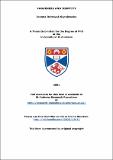Files in this item
Vagueness and identity
Item metadata
| dc.contributor.advisor | Clark, Peter | |
| dc.contributor.advisor | Broome, John | |
| dc.contributor.author | Odrowąż-Sypniewska, Joanna | |
| dc.coverage.spatial | 300 p. | en_US |
| dc.date.accessioned | 2018-03-12T14:13:40Z | |
| dc.date.available | 2018-03-12T14:13:40Z | |
| dc.date.issued | 2001 | |
| dc.identifier.uri | https://hdl.handle.net/10023/12912 | |
| dc.description.abstract | The main focus of this thesis is indeterminate identity and its relations to vague objects and to imprecise designation. Evans's argument concerning indeterminate-identity statements is often regarded as a proof that vague objects cannot exist. In chapter I I try to argue that the argument may be refuted by vague objects theorists. In chapter II I present various accounts of what indeterminate identity between objects may consist in and three different characteristics of it. I argue that there are objects whose identity is indeterminate and that such indeterminacy is ontic in the sense that it concerns individuation and spatio-temporal boundaries of objects. I also formulate the argument showing that (independently of Evans's argument) terms designating indeterminately identical objects cannot be precise designators. Chapter III is devoted to problems concerning vagueness and identity-over-time. The indeterminate answer to the questions concerning diachronic identity in puzzling cases can be regarded as the correct response by both endurantists and perdurantists. However, while for perdurantists the whole vagueness of persistence conditions is a conceptual matter, for endurantists it deserves the name of "ontic vagueness". Chapter IV focuses on questions concerning vagueness and identity-at-a-time. I offer a new solution to the problem of the many, according to which in each case in which the problem arises there is - contrary to appearances - only one (vague) object present. The problem arises because each such object has many precisifications, which nevertheless have no ontological significance. I also propose a new account of what it takes for an object to be vague. Chapter V deals with indeterminate identity in the domain of quanta. The first part investigates the various problems concerning identity and individuation of quantum particles, whereas the second part is devoted to analysis and critique of E. J. Lowe's example of alleged indeterminate identity-over-time between electrons. | en_US |
| dc.language.iso | en | en_US |
| dc.publisher | University of St Andrews | |
| dc.subject.lcc | B105.V33O3 | |
| dc.subject.lcsh | Vagueness (Philosophy) | en |
| dc.subject.lcsh | Identity (Philosophical concept) | en |
| dc.title | Vagueness and identity | en_US |
| dc.type | Thesis | en_US |
| dc.type.qualificationlevel | Doctoral | en_US |
| dc.type.qualificationname | PhD Doctor of Philosophy | en_US |
| dc.publisher.institution | The University of St Andrews | en_US |
This item appears in the following Collection(s)
Items in the St Andrews Research Repository are protected by copyright, with all rights reserved, unless otherwise indicated.

